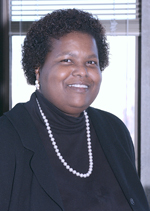MED prof to lead charge against health-care disparities
Michele David wins 2006 Physician Advocacy Fellowship

An immigrant from Haiti, Michele David has always tried to provide the highest quality care to her immigrant patients at Boston Medical Center. Now, thanks to a fellowship from the Institute on Medicine as a Profession, she will be able to improve her ability to do that.
David, an assistant professor of medicine at the Boston University School of Medicine and codirector of the BMC Haitian Health Institute, is one of four physicians chosen as a 2006 Physician Advocacy Fellow. As such, she will spend the next two years advocating to eliminate health disparities in diverse populations while working with Health Care for All, a Boston organization that promotes the creation of a health-care system responsive to the needs of all people.
“In my experience, I have found that in order to improve health care for patients, you need to do more than simply work one-on-one with patients,” says David, who was selected from a pool of 60 applicants. “Changing health care has to be done at population level, not on a one-on-one basis. I see that policy, what is legislated for health care, is another important way to improve access to care.”
Starting in July, David will lead Health Care for All’s Disparities Action Network, a coalition of Massachusetts organizations and institutions trying to address racial and ethnic disparities in health policy. Her main interest will be to improve care for Haitian immigrants.
She says that her work will focus primarily on responding to the findings of the Commonwealth’s Special Commission for the Elimination of Racial and Ethnic Health Disparities, which is set to release a final report this spring. “This is the first such statewide commission in the nation, and the intent for its final report is to serve as a blueprint for policy change to eliminate disparities,” she says. “It’s a unique opportunity to influence policy change. The recommendations will be thorough and comprehensive and will lay out a path for advocates and medical professionals to follow for years to come.”
Anticipating the results, David says that her goals are to decrease health-care disparities for underserved populations in Massachusetts, ensure that all health-care providers can work with diverse populations, increase diversity in the health-care workforce, eliminate inequities in health insurance, and improve access to health care and prescription drugs and information related to health care.
As a physician, she says, she is not accustomed to operating at a legislative and executive level. She hopes her time with the Disparities Action Network will help her learn how the legislature works so she can better advocate for special issues, such as changes in health-care policy.
“I hope to emerge from my Patient Advocacy Fellowship equipped to play a key role in policy change so as to improve health and health care for Haitian Americans, as my particular and initial focus, and ultimately for all disadvantaged populations in Greater Boston,” says David. “I believe that participation in the Fellowship will afford me the opportunity to reach the next level of my career by gaining the expertise required to achieve policy change.”
Although David hopes to broaden her horizons through the fellowship, she has no plans to give up practicing medicine. “I see advocacy as something I can do concurrently. Seeing patients is what informs my policy work,” she says. “I need to talk to patients to see what is bothering them, what is really important to them — that’s what will affect my policy work.”